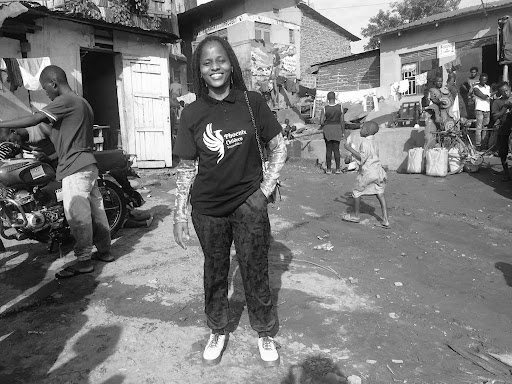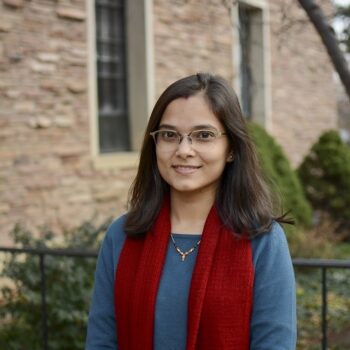In recent years, the Ugandan government has shown increasing disregard for the rule of law and fair elections — arresting protestors and journalists and restricting access to the internet and social media. Darren Namatovu — a 22-year-old activist and founder of Phoenix Children Foundation in Uganda — works to empower young people through education, outreach, and creative uses of digital communications. She has demonstrated leadership, courage, and ingenuity in a context where protest and activism bear great risks, walking a tightrope between encouraging youth voices and fighting for human rights while avoiding the scrutiny of government agents. But, for Namatovu, the fight is more important than the risks. As she asks, “We are young people. If we do not speak up against the leadership and how it is not working for us, then who will?”
This interview has been edited and condensed.
Ishita Pradhan: What are some issues that you have been taking up in your activism?
Darren Namatovu: I was recently working on a rape assault case of an eight-year-old child. The people who raped the little girl were people in power. They thought the girl child, and her people, are vulnerable people and cannot do anything about the rape. The sibling of the child victim, who was aware of my activism, reached out asking for my help. So I took up the case and started posting about it on social media. The case started to get a lot of public attention and attracted lawyers offering free consultations and organizations offering free psychosocial support. Because of that, the perpetrators at least stopped harassing the family of the victim.
When I posted, the police called me and said, “We are reading about this case you put on social media, can you tell us more?” I took the case to the section of the police that works on gender and children’s rights. Unfortunately, the police pretended like they were on our side but turns out they were supporting the party that assaulted the child. That is when they started approaching me in disguise and following me around to figure out who this person is who is going against powerful people to help this victim’s family. I got a call where they told me, “You need to stop. If you don’t stop, we are coming after you next.” I have been receiving threats to my life, including threats of assault and rape. I have come to the conclusion that, although I cannot take the risk of protesting in public spaces, I can utilize social media to publicize the issue.
Pradhan: What is the status of democratic spaces and youth voice in Uganda?
Namatovu: The case I shared with you is one of the reasons I work for youth’s free speech because there is no free speech in Uganda. Even if you just put up a post, they will come for you. Youth need to learn how to put their ideas out there safely without being threatened and stopped from doing what we love. They say that we, young people, don’t know how to speak; we just say things that come to our mind. But we want to change that.
Another issue affecting youth in Uganda is that leaders do not want to give up power. The President has not given up power for 35 years now. Eighty percent of the population in Uganda is youth below 35 years of age. The President says we are stubborn grandkids; we don’t know what we want. We really do know what we want — we want him out of power. We want change and a fair and free democracy; we have felt the unfair pinch of this leadership already.
Pradhan: Please tell me about some of the strategies working for you and other youth activists in Uganda.
Namatovu: On a personal level, I use the power of social media a lot. If youth do not put out their thoughts, people would not know what youth think, why youth are striking, what kind of workshops they are organizing and why they are organizing those.
As part of my work at CYPAN [Commonwealth Youth Peace Ambassadors Network] and Phoenix Children Foundation, I lead organizing with youth on how to equip themselves with the power of social media. I also use social media to connect with people to spread the word about what is happening in the country and activist efforts such as workshops and strikes. Due to the ongoing pandemic, we organized a lot of these workshops online where we gathered the youth ambassadors from different countries and exchanged ideas and learned a lot.
During the COVID-19 pandemic, as part of my peace ambassadorship with CYPAN, we organized online demonstrations where youth could protest from their homes with placards of their demands and post the pictures on social media. Through these efforts we tried to bring youth activists together even if we could not meet physically.
We also organized workshops on Zoom during the shift to online. However, we found that some youth were not able to join Zoom due to access issues. We responded to this by leveraging the youth’s love for social media, such as by organizing workshops on Twitter and Instagram.

Pradhan: What change happened as a result of the organizing work?
Namatovu: Years ago, it was very hard to even have these spaces. That we could meet up and talk about things — there’s a small change. Bigger changes are a long, long journey. We are in a country where bringing change as a youth is hard, but we are trying to get there slowly. But we can’t do it alone. We need collaborative effort. It means me, you, and any youth around the world that really care about their country, their communities, and their future coming together. We need to come together because the issues that are affecting me are also the issues affecting many people in different countries. We are the new generation and we are rising for what we believe in and what is right.
Pradhan: What other challenges have you faced in your organizing efforts?
Namatovu: Youth are not taken seriously in Uganda, and our families also do not support youth activism due to the threats and fear of loss of life. One time, a person called me and said they would like to interview me for my activist work. I said no and later I found out that it was a decoy set up to arrest me.
Pradhan: What role do you see for the international community in support of your work in Uganda?
Namatovu: There is a lot of economic and political instability and inequality in the Global South, and the Global North is contributing to these issues. They should clean up their mess, the impact of their colonialism on Uganda and Africa at large. We do not have a quality education system; there is inflation and climate change caused by countries in the Global North, and countries like Uganda suffer the worst impacts of this arrogance of power. In terms of the role, the international community should stop using the marginalized communities in times of crisis, such as inflation, political instability, and climate crisis to advance their agenda.

